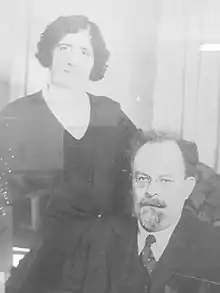Abraham Zevi Idelsohn
Abraham Zevi Idelsohn (Hebrew: אַבְרָהָם צְבִי אידלסון Avrohom Tzvi Idelsohn in Ashkenazi Hebrew; middle name also rendered Tzvi, Zvi, Zwi, or Zebi; June 11, 1882[1] – August 14, 1938) was a prominent Jewish ethnomusicologist and composer, who conducted several comprehensive studies of Jewish music around the world.

Idelsohn was born in Feliksberg, Latvia, then part of Russian Empire and trained as a cantor. He worked briefly in both Europe and South Africa before emigrating to Palestine in 1905 and establishing a school of Jewish music there in 1919. In 1922 he moved to Cincinnati, Ohio to take a position as professor of Jewish music at Hebrew Union College. He died in Johannesburg, South Africa, where he also supported the establishment of South African Progressive Judaism.[2][3] He is also famous for being the first researcher to document the folk music of Syrian Jews.[4]
Idelsohn is generally acknowledged as the “father” of modern Jewish musicology, despite his publishing starting after that of Angie Irma Cohon. During his time in Jerusalem, he noted a great diversity of musical traditions among the Jews living in the region. Idelsohn examined these traditional melodies and found recurring motifs and progressions that were not found in any other national music. This suggested a common origin for musical phrases that went back to Israel/Palestine in the first century C.E. He found that these motifs fell into three distinct tonal centers, which corresponded to the Dorian, Phrygian, and Lydian modes of the ancient Greeks. Each of these modes elicited a distinct psycho-emotional response. The Dorian Mode was used for texts of an elevated and inspired nature; the Phrygian for sentimental texts, with their very human outbreaks of feeling, both of joy and grief; and the Lydian was used in composing music for the texts of lamenting and confessions of sins. Idelsohn further categorized and defined these motives as ones that either prepared a musical phrase, began it, or concluded it.[5]
His works include the monumental Thesaurus of Hebrew Oriental Melodies (10 volumes, 1914–1932), Jewish Music (1929), and a collaboration with Cohon on Harvest Festivals, A Children’s Succoth Celebration.[6] He was also the music teacher to Moshe Nathanson, a well-known Jewish composer who is known to be the author of the lyrics to the famous Jewish folk song "Hava Nagila."[7][8]
He is the maternal grandfather of Joel Goodman Joffe (Baron Joffe).[8][9]
Notes and references
- Contradicting information about his date of birth can be found in various works of reference: the German Encyclopaedia judaica (1931) mentions June 14, 1882; Riemann Musiklexikon (1959) July 14, 1882, Baker's Biographical Dictionary of Musicians (2001) July 13, 1882. Idelsohn himself in the Hebrew version of his autobiographical sketch mentions the correct date as 24 Sivan 5682 (= June 11, 1882) and notes, that the birth was registered in official documents on July 1, 1882. see: Israel Adler et al. (ed.): The Abraham Zvi Idelsohn Memorial Volume. The Magnes Press, Jerusalem 1986, pp. 16 and יז.
- A history of Reform Judaism in SA SAUPJ. Accessed on 6 December 2019
- Norman Lebrecht, The complete companion to 20th century music, Simon & Schuster, 2000. p. 175.
- Marks. "Music, History, and Culture in Sephardi Jewish Prayer Chanting". MDPI.
{{cite web}}: Missing or empty|url=(help) - "Ancient Echoes: Rediscovering Music & Chant of Middle Eastern Spirituality". San Antonio Vocal Arts Ensemble. savae.org. Archived from the original on March 24, 2015.
- JMWC (3 April 2016). "Irma (Reinhart) Cohon, Angie | Jewish Music WebCenter". Retrieved 2020-12-11.
- See Who Wrote Havah Nagilah? at RadioHazak.com
- Joel Joffe mentioned his grandfather and his grandfather's role in writing Hava Nagila in an appearance on BBC Radio 4 Desert Island Discs on 28 October 2007
- More evidence of the relationship between Idelsohn and Joffe is provided in this family tree
- Adler, Israel; Bathja, Bayer; Schleifer, Elijahu, eds. (1986). The Abraham Zvi Idelsohn Memorial Volume. YUVAL. Studies of the jewish music research centre. Vol. 5. Jerusalem: The Magnes Press. ISSN 0084-439X.
- Works by and about Abraham Zevi Idelsohn in University Library JCS Frankfurt am Main: Digital Collections Judaica
- Idelsohn at the Encyclopædia Britannica
- On-line access to Thesaurus of Hebrew Oriental Melodies: English edition, omitting vols 3–5
- Hebrew edition, vols 1–5 only